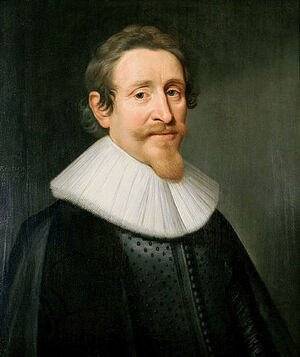Hugo Grotius (nonfiction): Difference between revisions
Jump to navigation
Jump to search
(Created page with "thumb|Portrait of Hugo Grotius by Michiel Jansz. van Mierevelt, 1631.Hugo Grotius (/ˈɡroʊʃiəs/; 10 April 1583 – 28 August 1645), also known a...") |
No edit summary |
||
| Line 16: | Line 16: | ||
== Nonfiction cross-reference == | == Nonfiction cross-reference == | ||
External links | == External links == | ||
* [https://en.wikipedia.org/wiki/Hugo_Grotius Hugo Grotius] @ Wikipedia | * [https://en.wikipedia.org/wiki/Hugo_Grotius Hugo Grotius] @ Wikipedia | ||
[[Category:Nonfiction (nonfiction)]] | [[Category:Nonfiction (nonfiction)]] | ||
[[Category:Jurists (nonfiction)]] | [[Category:Jurists (nonfiction)]] | ||
[[Category:People (nonfiction)]] | [[Category:People (nonfiction)]] | ||
Latest revision as of 14:57, 3 November 2021
Hugo Grotius (/ˈɡroʊʃiəs/; 10 April 1583 – 28 August 1645), also known as Huig de Groot (Dutch: [ˈɦœyɣ də ɣroːt]) or Hugo de Groot (Dutch: [ˈɦyɣoː də ɣroːt]), was a Dutch jurist.
Along with the earlier works of Francisco de Vitoria and Alberico Gentili, Grotius laid the foundations for international law, based on natural law.
A teenage intellectual prodigy, he was imprisoned for his involvement in the intra-Calvinist disputes of the Dutch Republic, but escaped hidden in, ironically, a chest of books.
He wrote most of his major works in exile in France.
In the News
Fiction cross-reference
Nonfiction cross-reference
External links
- Hugo Grotius @ Wikipedia
